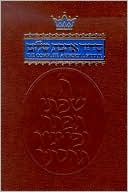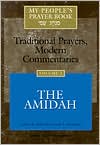Seyder Tkhines: The Forgotten Book of Common Prayer for Jewish Women
The Seyder Tkhines, translated from its original Yiddish by noted tkhines scholar, Devra Kay, and centerpiece of this groundbreaking work, was a standard Yiddish prayer book for women. It first appeared in Amsterdam in 1648, and continued to be published for the next three generations, usually inside the Hebrew synagogue prayer book. A product of an age when mysticism pervaded mainstream Judaism, the Seyder Tkhines provided women with newly composed, alternative daily prayers that were more...
Search in google:
The Seyder Tkhines, translated from its original Yiddish by noted tkhines scholar, Devra Kay, and centerpiece of this groundbreaking work, was a standard Yiddish prayer book for women. It first appeared in Amsterdam in 1648, and continued to be published for the next three generations, usually inside the Hebrew synagogue prayer book. A product of an age when mysticism pervaded mainstream Judaism, the Seyder Tkhines provided women with newly composed, alternative daily prayers that were more specific to their needs. Included in this volume is a unique Yiddish manuscript dating from the 17th century—a collection of prayers written specifically for a rich, pregnant woman, which Kay discovered among the rare books of the Bodleian Library in Oxford, England. Now, for the first time, these prayers have been skillfully translated and brought to public view. In addition to her translations, Kay presents her own extensive commentary, providing a deeper understanding of the historic, religious, and cultural background of this period in Jewish history. This unparalleled book will have special appeal to those interested in the social, literary, and religious history of women, as well as the history of the Yiddish language and literature. The interest in these forgotten prayers and their significance to the lives of women has now been revived, and these tkhines are ready to be rediscovered by a modern readership. Publishers Weekly Now largely forgotten, these works of popular piety emerged in a time of remarkable messianic expectation and fervent holiness. Kay, who began researching these prayer books for her doctoral dissertation, writes that the prayer books flourished for approximately three generations and had no precedents in the history of Jewish prayer, since they were vernacular prayers written by and for women. Kay traces the development of the cottage industry of these prayer books, which proved to be financially profitable for printers and spiritually beneficial for women, who did not participate in many of the male-oriented rituals in the synagogue. Particularly interesting is a prayer book written specifically for an unnamed pregnant woman, who is encouraged to repent of her sins and be ever-ready for a possible departure from this world. One prayer explicitly beseeches God for an easy labor and a safe delivery. Kay does readers a great service by collecting these historic prayers into this volume and providing helpful commentary.
Pt. 1CommentaryCh. 1Introducing tkhines3Ch. 2Profit and prayer : women and a unique pan-European printing industry15Ch. 3The Seyder tkhines : a book for a messianic age33Ch. 4Seyder tkhines : definitions49Ch. 5Side by side by Seyder71Ch. 6A rare manuscript lost and found : book of tkhines for a pregnant woman87Ch. 7Other yiddish prayers and religious songs and their authors95Ch. 8Seyder tkhines in the twenty-first century : the messianic inheritance113Pt. 2Prayers in translationThe Seyder tkhines125Daily tkhines125Sabbath tkhines148Nide tkhines157Fast-day tkhines165Four graveside tkhines175New Year and Day of Atonement tkhines181Book of tkhines for a pregnant woman185Single prayers and songs in tkhine language217Sabbath prayer217How good (Ma Toyvu)219Simkhes Toyre song221A tkhine to be said before Kedushe224A song of the Ten Commandments225Song (Lid)230Father, king236Daily tkhine (an extract)243
\ Jewish Book World"This gem of a book deals with a 'forgotten' volume of tkhines from the 17th century . . . . A work of impeccable scholarship, it is even accessible to those with little knowledge in this area . . . . This book is a major contribution to the literature."—Jewish Book World\ \ \ \ \ JOFA Journal"Kay has done us a great service in providing these translations together with her suggestive analysis of the texts and their contexts."—JOFA Journal\ \ \ Blu Greenberg"Devra Kay is brilliant! . . . This book not only fills a white space in Jewish women's liturgical history, it is a gift to all Jewish women and men who want to come closer to the religious life of their forbears, and thus, to their own."—Blu Greenberg, co-founder and first president of the Jewish Orthodox Feminist Alliance\ \ \ \ \ London Jewish Chronicle"A fascinating examination of the work . . . . Devra Kay weaves a marvelous picture of the economic, religious, and social background of the [Seyder Tkhines]."—Jewish Chronicle, London\ \ \ \ \ Jewish Book World"This gem of a book deals with a 'forgotten' volume of tkhines from the 17th century . . . . A work of impeccable scholarship, it is even accessible to those with little knowledge in this area . . . . This book is a major contribution to the literature."—Jewish Book World\ \ \ \ \ \ JOFA Journal"Kay has done us a great service in providing these translations together with her suggestive analysis of the texts and their contexts."—JOFA Journal\ \ \ \ \ \ Publishers WeeklyNow largely forgotten, these works of popular piety emerged in a time of remarkable messianic expectation and fervent holiness. Kay, who began researching these prayer books for her doctoral dissertation, writes that the prayer books flourished for approximately three generations and had no precedents in the history of Jewish prayer, since they were vernacular prayers written by and for women. Kay traces the development of the cottage industry of these prayer books, which proved to be financially profitable for printers and spiritually beneficial for women, who did not participate in many of the male-oriented rituals in the synagogue. Particularly interesting is a prayer book written specifically for an unnamed pregnant woman, who is encouraged to repent of her sins and be ever-ready for a possible departure from this world. One prayer explicitly beseeches God for an easy labor and a safe delivery. Kay does readers a great service by collecting these historic prayers into this volume and providing helpful commentary.\ \ \ \ \ Library JournalKay's reclamation of this nearly lost tradition in Jewish writing and practice is a great accomplishment. The tkhines were prayers directed to, in the voices of, and most likely written by Jewish women, and the tradition seems to have begun as early as the 17th century. Kay's translations are flat and even awkward ("God Almighty You have punished we [sic] women" is a notable gaffe), but her brief commentaries, which discuss the significance of the tkhines in a newly literate and keenly Messianic moment in European Jewish culture, are intelligent and valuable. While much more remains to be said about these women's prayers, Kay's work is a fine introduction. Highly recommended. Copyright 2004 Reed Business Information.\ \








